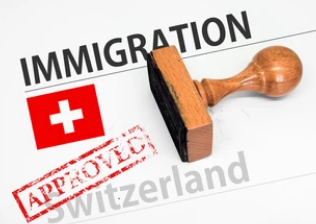The Swiss immigration system is one of the most severe in the world for any non-European citizen planning to move to Switzerland. Following the 2006 voting initiative by the Swiss Conservative party, “Against mass immigration”, the federal law was modified, tightening and restricting conditions for obtaining a Swiss residency permit and Swiss citizenship.
These modifications have one goal: encouraging and supporting the integration of foreigners in Switzerland. In practice, this results in introducing conditions to meet directly linked to the level of integration of the foreigner to be able to receive a permit and to be eligible for naturalization after a number of years.
As a result, some members of our expat community are facing a recurrent issue when applying for or renewing a permit, delivering the required language certificate to be able to live in Switzerland. Thus, Swiss immigration authorities have resumed integration requirements : the capacity of the foreigner to communicate in the language spoken at the place of domicile; the ties of the applicant with the local community and his/her involvement into economic life; the applicant’s compliance with Swiss order and security and lastly; his/her financial stability and autonomy. The canton, when applying their discretionary power in reviewing a non-European permit application or naturalization application, will make sure that all these points are addressed.
This article focuses on non-European citizens, as EU-27/EFTA citizens are regulated by the EU Agreement on the Free Movement of People, allowing any citizen member of one of these countries to settle and work in Switzerland without too many restrictions, as long as they can demonstrate financially stability.
For non-European citizens, the Swiss permit procedure is quite complex and different permits apply for different purposes. Each type of non-European permit application is conditioned depending on the purpose: study, work, family reunification, asylum or retiree permit.
So, what are the golden rules to keep in mind?
Rule 1
Make the effort to learn the language. At some stage, you will need to demonstrate a Fide language certificate showing that you can communicate in the language spoken at the place of your domicile. Different levels apply for different permits, and make sure that every member of your family is making efforts to learn the local language. B1 level spoken is required for permanent residency and naturalization.
Rule 2
Make sure you build social ties with your local community. It is assumed that through your job or your studies, you build up a social network with locals, but it is not always the case. If your work environment or school institution involves only expats speaking English, connect with locals by joining a local association or club. This could be useful later if you wish to apply for a fast-tracked C permit after 5 years of residency or for naturalization, where you will have to justify of existing social ties with your local community.
Rule 3
Avoid requesting financial support from General Hospice, if you can. If you find yourself in a situation of personal distress or if you are requesting asylum, it is difficult to avoid the financial help provided by the state. However, when you are applying for a B and C permit, you will have to produce an attestation from General Hospice showing that you have not received any help for the past 5 years and that you are financially independent. For an asylum seeker who has been receiving financial support and who wishes to transform an F permit into a B, theses aspects will be reviewed carefully by the canton.
Rule 4
Pay your bills and avoid pursuits being registered in your name. Thus, when applying for any type of permit or when renewing a B permit, an attestation of non-pursuit is required to ensure that you are following the rules and paying your bills. A pursuit can last for a while on your track record if you do not specifically ask to have it removed after settling the late bill.
Rule 5
Be careful when you are driving, a severe speeding offence can end up on your criminal record. As such, any infractions going through the public ministry ends up with a heavy fine and appears on your criminal record. This often come as an unpleasant surprise, especially when it blocks a naturalization procedure for the next 5 years. To apply for a C permit or citizenship, your criminal record must be blank.
Rule 6
Don’t leave the country for more than six consecutive months! When holding any type of permit, your center of interest must be based in your canton of domicile, not in another country. You are required to live in Switzerland at least 180 days per year and not leave the country for more than 6 consecutive months. Your permit could be cancelled if you overstay overseas. The rest of Europe in the Schengen zone is not Switzerland. Your life, work or studies are assumed to be in Switzerland if you are holding a Swiss permit. Some exceptions can apply and are subject to authorization and the discretionary power of the canton.
Rule 7
Maintain your center of interest and social ties in Switzerland if you must spend time overseas for study of professional reasons. A B permit cannot be “frozen” but a C permit can be put on hold up to four years for family or professional reasons. The C permit must be returned and is restituted upon request of the applicant. These absences can be problematic if you are planning to apply for citizenship, where you must have lived a number of years in your canton just before applying and show integration in your commune and canton.
Rule 8
Planning to separate or divorce ? Think about how you will remain in Switzerland if you separate before 3 years of marriage, if you hold a B permit for family reunification. Thus, as a non-European spouse holding that type of permit, you are dependent on your spouse to maintain your residency status in the country. If you have lived for at least 3 years being married in Switzerland, you can separate and maintain your B permit, if you fulfill integration requirements and if you are financially stable. If you have children, sharing custody is not sufficient to grant you the right to stay in Switzerland.
Rule 9
Planning to apply for naturalization? Get interested in cantonal and federal voting subjects. You will have to demonstrate your interest in acquiring civic rights when applying for naturalization. Switzerland is a democracy where it is expected that citizens actively participate. As such, you could be fined if you don’t vote, once naturalized.
Rule 10
Make sure you check with your cantonal immigration authority before changing your domicile to another canton. Remember that each canton has their own immigration authority ruling permit regulations. A non-EU retiree who obtains B permit cannot change cantons in the first five years without authorization. A non-EU who was granted a B permit for a specific job in Switzerland through his employer cannot change employment during the first years. A student cannot change study plans or take part-time employment if the canton hasn’t authorized it. Report any changes of situation to your local immigration authority !
Conclusion
Integration is the key to open the door to Swiss permanent residency and citizenship. Learn the language, make local friends, participate in your canton’s cultural and economic life, get interested about the cantonal and federal voting topics, respect the rules and the law and you will see that the door will open.
05/12/22 – Alexa Mossaz, immigration specialist at Legal Expat




